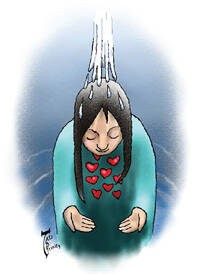Love Makes Sense of God
T. S. Eliot once remarked that “there are some things about which we can say nothing, but before which we dare not keep silent.” This is a good starting place for the Christian understanding of God. Since our concepts apply to the world of objects in the physical universe, and God is not part of this, God cannot be conceptualized exactly. The witness of our philosophers, theologians and saints tells us that God dwells in absolute mystery. So when we consider divine revelation concerning God, we must be mindful of our limits.
But we dare not keep silent. In today’s first reading, we find Moses finishing his first long speech in Deuteronomy. It is clear that Yahweh is not one of many gods, a point that Israel did not really grasp until after the exile. Rather, there is only one God. “All this you were allowed to see that you might know the Lord is God and there is no other.”
Christianity, of course, remains loyal to this monotheism; our God is the God of Abraham, and there is only one God. But now we have to deal with such revelation as “The Word was with God and the Word was God” (Jn 1:1), “the Lord is the Spirit” (2 Cor 3:17). In the Gospel, Jesus sends his disciples out into the world “baptizing them in the name of the Father, and of the Son, and of the Holy Spirit” (Mt 28:19). This reflects the baptismal formula of the early church and obviously witnesses to a Trinitarian revelation.
Now how does one conceive of one God as Trinity? Are there three divine beings separate from each other but all sharing the same divine nature? Scripture often seems to say this: the Father sending the Son, the Son giving us the Spirit, the Son glorifying the Father and the like. The use of the term persons also conjures up images of distinction. But such distinction, taken absolutely, undermines the monotheism of “The Lord is God and there is no other.”
Or perhaps we might consider a single divine being who is experienced in three modes. This view protects monotheism, but hardly seems Trinitarian. This position became known as the heresy of Sabellianism, and it has not been completely stamped out. Last Trinity Sunday I heard a homily in which the priest likened the Trinity to ice, water and vapor—three expressions of the same substance. After Mass I felt like saying, “You know you’re a heretic, right?” Instead, I said something like, “Nice homily, Father” and let it go. The early church debated for centuries about the Trinity, mostly deciding on what was unacceptable, trying to protect both revelation and the mystery of God.
The dogma of the Trinity is central to Christian spirituality. Our tradition sees the Holy Spirit as the spiritual horizon through which we come to the risen Christ. Life in the Spirit brings us intimacy with Jesus. We believe that the Father is the eternal source from which the Son and Spirit eternally proceed. This gives the Father a kind of priority as we pray to the Father through the Son, in the Spirit.
The dogma of the Trinity tells me that the very nature of divinity is dynamic love. For any lover there must be a beloved, and love shared abounds in creative power. Love gives love (Father to Son), shares love (Son and Father) and becomes a fountain of life (Holy Spirit). Love itself is triune. The Holy Spirit is the life of the church because the Spirit is the common good of the Father and the Son. The Spirit infuses us with God’s love for us and draws us into the mystery of our redemption. We know the Trinity not by mental abstractions but by the experience of the Father’s love for us, infused with the Spirit in intimacy with Jesus Christ. Trinity is a mystery for sure, but not meant for confusion. Fundamentally, the dogma of the Trinity reveals profound truths about God’s dynamic life and love.
This article also appeared in print, under the headline “Love Makes Sense of God,” in the May 28, 2012, issue.








